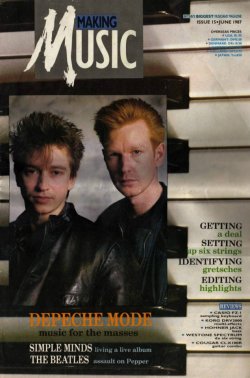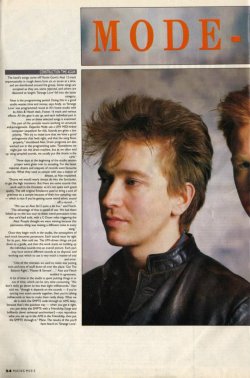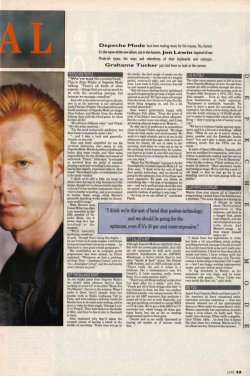Mode-Al
[Making Music, June 1987. Words: Jon Lewin. Pictures: Grahame Tucker.]
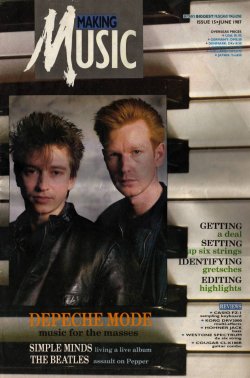
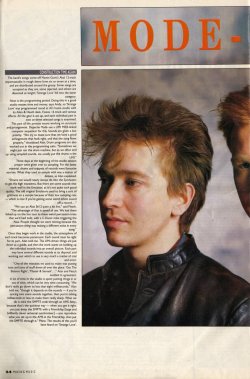
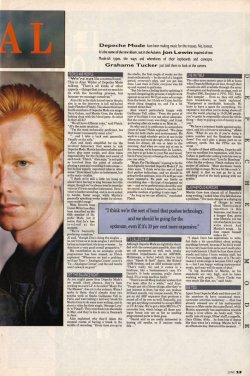
Depeche Mode have been making music for the masses. No, honest. It’s the name of the new album, out in the Autumn. Jon Lewin inquired of two Mode-ish types, the ways and wherefores of their keyboards and concepts. Grahame Tucker just told them to look at the camera.
People Are People
“We’re not like a normal band.” This is Alan Wilder of Depeche Mode talking. “There’s all kinds of other aspects – things that are not so much to do with the recording process, but because we manage ourselves.”
Alan (Al) is the dark-haired one in the pic; also in on the interview is tall red-haired Andy Fletcher (Fletch). The absent third and fourth members of Depeche Mode are singer Dave Gahan, and Martin Gore, the cheeky looking chap with the blond perm. So what do they all do?
“We all have different roles,” said Fletch. “Al’s the main musician…”
“I’m the most technically proficient, but that doesn’t necessarily mean a lot.”
“…and I take a back seat generally. Usually on the sofa.”
Alan and Andy simplified for me the involved democracy that seems to rule Depeche Mode. Martin handles melodies and lyrics, plus some vocals, and Alan takes responsibility for the rhythm and sound of each track. “Fletch,” Alan says, “is not quite so involved from the point of actually playing a part and recording it onto a tape – but he has equally important roles in other areas.” Dave doesn’t play an instrument, but is the main vocalist.
“I think we’re still a little bit hung up about Dave having to sing because he’s the singer, though we’ve always tried to treat the voice as if it was another instrument. [1] Dave’s voice is harder sounding, and is more suited to harder, faster songs, while Martin’s generally speaking works better for slower, more soulful songs.”
Mute Records boss Daniel Miller has often been described as the fifth member of Depeche Mode, but it seems that he’s less involved at the moment.
“We’re basically producing ourselves,” Al said, “though Dan’s doing the singles – he can’t trust us to make singles. I still think he has an important role as an overseer… he does have a very good overall perspective.”
His contribution as an analogue synth programmer has been missed, as Fletch explained. “Whenever we had a problem, we’d say ‘Dan – Analogue Corner’, now it’s ‘Us – Analogue Corner’, and the end results aren’t always as good.”
Get The Balance Right
As you might guess from Depeche Mode’s ten month chart absence, they’ve been working on a new LP, to be called ‘Music For The Masses’, due out in the autumn. When I spoke to them, they’d already done two months’ work at Studio Guillaume Tell in Paris, and were taking a mid-way break for Martin Gore to do some more writing, and to shoot a video for their single ‘Strange Love’ (b/w ‘Pimpf’). They went back into the studio in May, and they’re due to mix in Denmark in June.
Alan explained why they’d taken the unusual course of having a break in the middle of recording. “Every time you go in the studio, the first couple of weeks are the most enthusiastic – by the end of a longish period, everyone’s edgy, and you get less done. Last week in Paris, everyone was fed up and wanted to get home.
“But I do have a feeling that by splitting it up and elongating the process, it might work against us as well. We’ll get some advantage from the break, but I think we’ll also find the whole thing dragging on, and I’m a bit worried about that.”
Alan wasn’t particularly happy with Guillaume Tell, either. “From the point of view of facilities it was just about adequate. But the control room was dingy, and it just got boring after six weeks or so. Most do…”
So why use it in preference to somewhere closer to home? Fletch explained. “We chose Paris for both studio and environment. We work to a rigid schedule: get in at one in the afternoon and work through, with an hour’s break for dinner, till one or later in the morning. And when we come out at one in the morning, we’re hyperactive. In London, you have to go home to your flat and brood, but in Paris you can at least go for a drink. So you can relax.”
‘Music For The Masses’ is going to be the first digitally recorded Depeche Mode LP. As Alan says, “I think we’re the sort of band that pushes technology, and we should be going for the optimum, even if it is 30 per cent more expensive. We push our limits on everything else – the type of equipment we use – and we’re perfectionist about the way we record so it seems logical to use the best possible medium of getting it onto tape.”
“As long as we can afford it,” concluded Fletch.
It’s Called A ARP
Although Depeche Mode are rightfully identified with the newest gear possible, they still use old equipment as well, such creaky seventies impedimenta as an ARP2600, Minimoogs, a Kobol (which they’ve had since ‘Speak & Spell’ days), the Roland 100M System, and an AKS suitcase synth: “That’s really old, and it comes in a briefcase, like a businessman’s case. It looks amazing, really James Bond. It’s a noise machine really.”
“There’s an old Moog modular system that I’ve been after for a while,” said Alan. “People get rid of those things after they’ve lost interest in them, but they can produce brilliant sounds, very unique sounds. We’ve got an old ARP sequencer that produces a sound all of its own as well. Basically, you can get anything converted to accept MIDI or CV & Gate. We’ve got a little MIDI to CV converter box, which brings all those analogue boxes into use as far as sending programmed parts into them goes.
“Daniel and us [sic] are really interested in buying old synths, so if anyone reads this…”
[Making Music, June 1987. Words: Jon Lewin. Pictures: Grahame Tucker.]
An average article approaching the band from a technical angle, assuming the reader is mostly interested in details of equipment and studio technique, knows of Depeche Mode but isn't intimately familiar with them. Plenty of information on the successive stages of recording an album, and a section of nitty-gritty equipment details too." "We have a constant battle against equipment, and it is a bit nerve wracking,” added Alan. “What do you do if you’re doing a piano number and the Emulator breaks down? You can’t play a piano part on an ordinary synth." "



Depeche Mode have been making music for the masses. No, honest. It’s the name of the new album, out in the Autumn. Jon Lewin inquired of two Mode-ish types, the ways and wherefores of their keyboards and concepts. Grahame Tucker just told them to look at the camera.
People Are People
“We’re not like a normal band.” This is Alan Wilder of Depeche Mode talking. “There’s all kinds of other aspects – things that are not so much to do with the recording process, but because we manage ourselves.”
Alan (Al) is the dark-haired one in the pic; also in on the interview is tall red-haired Andy Fletcher (Fletch). The absent third and fourth members of Depeche Mode are singer Dave Gahan, and Martin Gore, the cheeky looking chap with the blond perm. So what do they all do?
“We all have different roles,” said Fletch. “Al’s the main musician…”
“I’m the most technically proficient, but that doesn’t necessarily mean a lot.”
“…and I take a back seat generally. Usually on the sofa.”
Alan and Andy simplified for me the involved democracy that seems to rule Depeche Mode. Martin handles melodies and lyrics, plus some vocals, and Alan takes responsibility for the rhythm and sound of each track. “Fletch,” Alan says, “is not quite so involved from the point of actually playing a part and recording it onto a tape – but he has equally important roles in other areas.” Dave doesn’t play an instrument, but is the main vocalist.
“I think we’re still a little bit hung up about Dave having to sing because he’s the singer, though we’ve always tried to treat the voice as if it was another instrument. [1] Dave’s voice is harder sounding, and is more suited to harder, faster songs, while Martin’s generally speaking works better for slower, more soulful songs.”
Mute Records boss Daniel Miller has often been described as the fifth member of Depeche Mode, but it seems that he’s less involved at the moment.
“We’re basically producing ourselves,” Al said, “though Dan’s doing the singles – he can’t trust us to make singles. I still think he has an important role as an overseer… he does have a very good overall perspective.”
His contribution as an analogue synth programmer has been missed, as Fletch explained. “Whenever we had a problem, we’d say ‘Dan – Analogue Corner’, now it’s ‘Us – Analogue Corner’, and the end results aren’t always as good.”
Get The Balance Right
As you might guess from Depeche Mode’s ten month chart absence, they’ve been working on a new LP, to be called ‘Music For The Masses’, due out in the autumn. When I spoke to them, they’d already done two months’ work at Studio Guillaume Tell in Paris, and were taking a mid-way break for Martin Gore to do some more writing, and to shoot a video for their single ‘Strange Love’ (b/w ‘Pimpf’). They went back into the studio in May, and they’re due to mix in Denmark in June.
Alan explained why they’d taken the unusual course of having a break in the middle of recording. “Every time you go in the studio, the first couple of weeks are the most enthusiastic – by the end of a longish period, everyone’s edgy, and you get less done. Last week in Paris, everyone was fed up and wanted to get home.
“But I do have a feeling that by splitting it up and elongating the process, it might work against us as well. We’ll get some advantage from the break, but I think we’ll also find the whole thing dragging on, and I’m a bit worried about that.”
Alan wasn’t particularly happy with Guillaume Tell, either. “From the point of view of facilities it was just about adequate. But the control room was dingy, and it just got boring after six weeks or so. Most do…”
So why use it in preference to somewhere closer to home? Fletch explained. “We chose Paris for both studio and environment. We work to a rigid schedule: get in at one in the afternoon and work through, with an hour’s break for dinner, till one or later in the morning. And when we come out at one in the morning, we’re hyperactive. In London, you have to go home to your flat and brood, but in Paris you can at least go for a drink. So you can relax.”
‘Music For The Masses’ is going to be the first digitally recorded Depeche Mode LP. As Alan says, “I think we’re the sort of band that pushes technology, and we should be going for the optimum, even if it is 30 per cent more expensive. We push our limits on everything else – the type of equipment we use – and we’re perfectionist about the way we record so it seems logical to use the best possible medium of getting it onto tape.”
“As long as we can afford it,” concluded Fletch.
It’s Called A ARP
Although Depeche Mode are rightfully identified with the newest gear possible, they still use old equipment as well, such creaky seventies impedimenta as an ARP2600, Minimoogs, a Kobol (which they’ve had since ‘Speak & Spell’ days), the Roland 100M System, and an AKS suitcase synth: “That’s really old, and it comes in a briefcase, like a businessman’s case. It looks amazing, really James Bond. It’s a noise machine really.”
“There’s an old Moog modular system that I’ve been after for a while,” said Alan. “People get rid of those things after they’ve lost interest in them, but they can produce brilliant sounds, very unique sounds. We’ve got an old ARP sequencer that produces a sound all of its own as well. Basically, you can get anything converted to accept MIDI or CV & Gate. We’ve got a little MIDI to CV converter box, which brings all those analogue boxes into use as far as sending programmed parts into them goes.
“Daniel and us [sic] are really interested in buying old synths, so if anyone reads this…”

